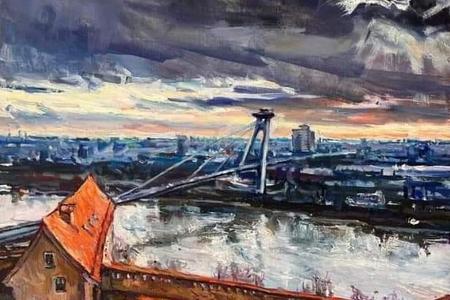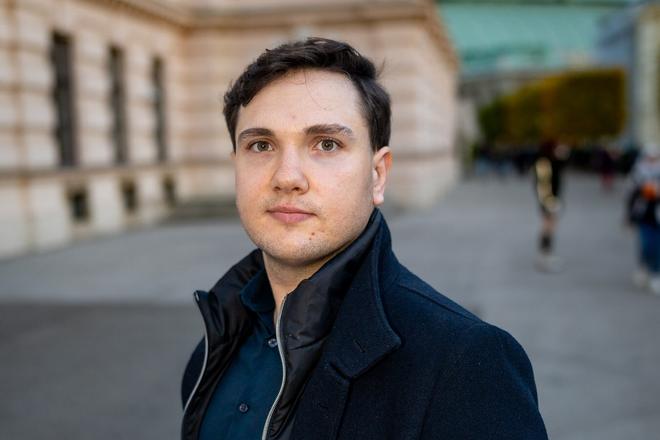This story is available in Slovak and Ukrainian.
Four days before Christmas, when many Slovaks were absorbed in wrapping up their preparations for the holidays and buying last-minute presents, Vasyl Alekseev was standing on a small stage and belting out one Christmas carol after another.
During a charity concert for Ukrainian refugees, held in a cosy hall of the Ukrainian-Slovak House in Bratislava, he was singing “Let It Snow” and “Jingle Bells”, popular English Christmas songs, as well as Slovak and Ukrainian carols such as “Šťastné A Veselé” (Merry Christmas) and “Nova Radisť Stala” (A New Joy Has Come), while Saint Nicolas was giving candies to children.
But this Christmas concert was no more special than what the Kyiv-born artist usually does during other concerts of his. He often blends different genres and gets the public engaged in his performances in the hope of making opera - his favourite music genre - more appealing to the masses.
For this reason, he busks on the streets at times.
“I love watching people pass by and suddenly stop when they hear opera. For them, it’s pure magic,” the tenor tells The Slovak Spectator, seated in a chair at a cafe in downtown Bratislava. “They’re listening, and I can see that they’re wondering how is it possible to sing like that.”
His observant girlfriend, Iryna, sits next to him. Alekseev met her nine years ago in Kyiv. They studied in the same school and played instruments in an orchestra. But Iryna isn’t just his girlfriend. It was she who accompanied him and played the piano and flute at the charity concert in Bratislava. They also have other projects in the works.
“We want to make our own concert programme where I’ll sing not only arias but also pop songs,” the artist notes. “I enjoy this kind of experiment.”
They have already recorded and produced some of their own songs, but Alekseev says that nobody has heard them yet.
In the meantime, he can also be seen performing in Bratislava’s Old Town during the weekends. More frequently, however, he sings on the streets in Vienna. Alekseev perceives the Austrian capital as the cultural capital of Europe and adores its atmosphere.
“Tickets for concerts are sold literally at every corner there. And that’s great!” he says.
Vasyl Alekseev sings opera at the bus station in Bratislava in May 2023.
From clarinet to choir singing
The 30-year-old singer, who was raised by his mother after his father left them, began to study music when he was six. He went to a prestigious musical school in the Ukrainian capital, where he learnt how to sing and joined a school choir.
Back then, he says, he didn’t dream of becoming a solo singer.
“When, at the age of 15, I had to choose between choral singing and playing the clarinet, I chose the clarinet,” Alekseev recalls.
He went on to study the clarinet at the Glier Academy in Kyiv, one of Ukraine’s oldest higher education institutions specialising in music. During his studies, the tenor, moreover, managed to find a part-time job - singing in the St Andrew’s Church Choir. He also sang in St Sophia’s Cathedral, which is part of an historic sanctuary complex and a landmark called Sophia of Kyiv.
A few years later, the artist established that he would try his luck abroad. He had never travelled abroad before. In the end, Slovakia became a new home for him. And because he enjoyed choir singing, he joined a Slovak choir in Nitra, western Slovakia, where he settled down for a time.
Nevertheless, he soon spotted the difference in the quality of Slovak and Ukrainian choirs.
“In Ukraine, we have a choir in every church, and singers are professionals. Most of the singers are students of music colleges and universities. But in Slovakia, there are not many choirs and the singers are mostly amateurs,” Alekseev explains.
At least, the “calm” and “friendly” Slovaks pleasantly surprised him. In Kyiv, he opines, people are in a hurry and refuse to chat. Things in Slovakia, he thinks, are different.
“People care about other people’s lives, communication is important to them,” the singer says.
‘Stay or go’ dilemma
Yet, in February 2022, the Ukrainian says, he was determined to leave Slovakia and return home after a phone call from his mother. She told him about Russia invading Ukraine, and that she wouldn’t leave Ukraine regardless of how things would be unravelling.
“She said she wanted to be of use and went to the centre where Molotov cocktails were made to repel the enemy’s attacks. She was ready to die and not let the Russians enter the city,” recalls the artist.
“I was ready to go home and defend my motherland, too,” he adds.
Alekseev says that he changed his mind after one of his street concerts in Bratislava. Slovakia’s former foreign minister Pavol Demeš saw him sing and soon after, convinced him to stay and help Ukraine in other ways. Demeš also told him that it was important to introduce Slovaks to Ukrainian art and traditions.
As soon as the first Ukrainian refugees crossed the Ukraine-Slovakia border, Alekseev and his girlfriend chose to share their Slovak experience with fellow Ukrainians and assist them in finding temporary homes. Today, the pair takes part in charity concerts that support, for example, Ukraine’s armed forces.
In the artist’s opinion, the cultural life of Ukranians in Bratislava has reached a new level.
“Many artists come here, as well as entrepreneurs ready to invest money in the development of the Ukrainian community.”

Big dreams
Alekseev invests in his talent, too. He says that he regularly goes to singing lessons in Bratislava where his vocal coach lives. This was the reason why he moved from Nitra to Bratislava, the artist says.
“When you sing alone, it’s one story, but when another person listens to you, it’s a completely different story,” the singer notes. “A teacher can tell you something that you simply cannot hear.”
It seems that his hard work has been paying off. He’s already appeared in several operas, in Giuseppe Verdi’s “Aida” and Eugen Suchoň’s “Svätopluk”, at the Slovak National Theatre. Alekseev had also sung on the talent show Czecho-Slovakia's Got Talent before he withdrew, as the show, he notes, was time-consuming and left him no space to cultivate his solo career. The Ukrainian even got a job offer from an opera choir in Banská Bystrica, central Slovakia, but decided to not accept because it would mean leaving Bratislava and singing lessons behind.
Becoming an opera singer remains his big dream, in addition to visiting every capital city in Europe, he tells The Slovak Spectator.
“I want to sing there and share the magic of opera with people all around Europe,” he concludes.
This article was created thanks to the UNESCO programme "Supporting Ukrainian Refugees Through Mass Media", financed by the Japanese government.


 Opera singer Vasyl Alekseev. (source: Ivana Lesić)
Opera singer Vasyl Alekseev. (source: Ivana Lesić)
 Vasyl Alekseev and his girlfriend Iryna. (source: Ivana Lesić)
Vasyl Alekseev and his girlfriend Iryna. (source: Ivana Lesić)